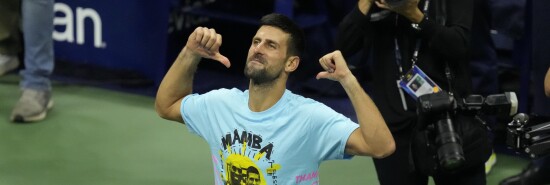
The power of Novak Djokovic
Jon Miltimore
Video Embed
Moments after defeating Russian tennis star Daniil Medvedev to win his record 24th Grand Slam at the US Open on Sunday, Novak Djokovic stripped off his shirt at center court, reached into a bag, and pulled out a light blue T-shirt.
Emblazoned on it was a photo of Djokovic and Kobe Bryant and the words “Mamba Forever.”
https://twitter.com/atptour/status/1701019641555091565
GRANHOLM ELECTRIC VEHICLE NIGHTMARE MAKES CASE FOR REVERSING CALIFORNIA MANDATE
It was a poignant moment for the Serbian star, who was denied the opportunity to play in the 2022 US Open because of his vaccination status. This likely made Djokovic’s victory on Sunday even sweeter, but it was the Serbian star’s tribute to the late Bryant that brought a tear to my eye.
“Kobe was a close friend,” the triumphant Djokovic said. “We chatted a lot about the winner’s mentality when I was struggling with injury and trying to make my comeback, work my way back to the top of the game.”
Djokovic’s classy move naturally drew praise and an abundance of media attention, yet few explored the “Mamba Mentality.” Many might think the term simply reflects Byrant’s pursuit of excellence through perseverance, but that’s only half the story.
As many know, Mamba Mentality derives from Bryant’s own nickname, “The Black Mamba,” a reference to the highly venomous snake native to parts of sub-Saharan Africa. But fewer realize that the Black Mamba was more than a nickname for Bryant. It was an alter ego he created around 2003 when he felt a lack of control over his life.
“I had to separate myself. It felt like there were so many things coming at once,” Bryant said in his 2015 autobiographical documentary Muse. “It was just becoming very, very confusing. I had to organize things. So I created ‘The Black Mamba.’”
Many think that Mamba Mentality is a frame of mind, but Bryant made it clear it’s more.
“Mamba Mentality is a way of life,” Bryant once said. “It’s not an attitude, per se. It’s a way you live.”
In other words, Mamba Mentality is a philosophy. It’s built on the idea of radical self-improvement and the idea that the individual can achieve mastery by getting better every single day “at whatever it is that you’re doing,” in Bryant’s words.
Those last seven words are the key. Mamba Mentality isn’t about basketball or tennis, though it can certainly be applied to them. It’s about the pursuit of mastery through sacrifice.
“If people knew how hard I worked to get my mastery,” Michelangelo once reputedly said, “it wouldn’t seem so wonderful at all.”
Kobe brought the same kind of artistry to the basketball court that Michelangelo brought to the Vatican, and he developed it the same way as the Renaissance-era sculptor.
During Bryant’s rookie season with the Los Angeles Lakers, he had a playoff game in which he famously shot four air balls, including a pair that would have tied the game in overtime. Four air balls in a game might have crushed some players, especially in a game that ended the Lakers’ season. For 18-year-old Kobe Bryant, it was an opportunity to get better.
“I went straight to Palisades High that night as soon as we landed,” he later told a reporter. “Knew the janitor, he opened up the gym for me and I was there until the sun came up.”
This was the Mamba Mentality that was beginning to burgeon in the young player’s mind, and it’s the same mentality that Djokovic used to defeat Medvedev.
The tall Russian was coming off a spectacular upset over defending champion Carlos Alcaraz, the tournament’s top-seed player and the top-ranked player in the world. Djokovic downed Medvedev in three straight sets, solidifying his claim as the greatest tennis player ever and tying Margaret Court for the most Grand Slams in history.
Djokovic very well might have won his 25th Grand Slam on Sunday if the U.S. government had not prohibited him from traveling to the United States to compete last year because he was not vaccinated against COVID-19 (even though unvaccinated fans were allowed to attend). The Serbian star could have played if he had opted to cave on his principles, as many other world-class athletes did. But Djokovic refused.
“I was never against vaccination,” he told the BBC, “but I’ve always supported the freedom to choose what you put in your body.”
CLICK HERE TO READ MORE FROM THE WASHINGTON EXAMINER
Many sports writers couldn’t understand what Djokovic was thinking. Kobe would have.
Jon Miltimore (@miltimore79) is managing editor of FEE.org, the online portal of the Foundation for Economic Education. Follow his work on Substack.
